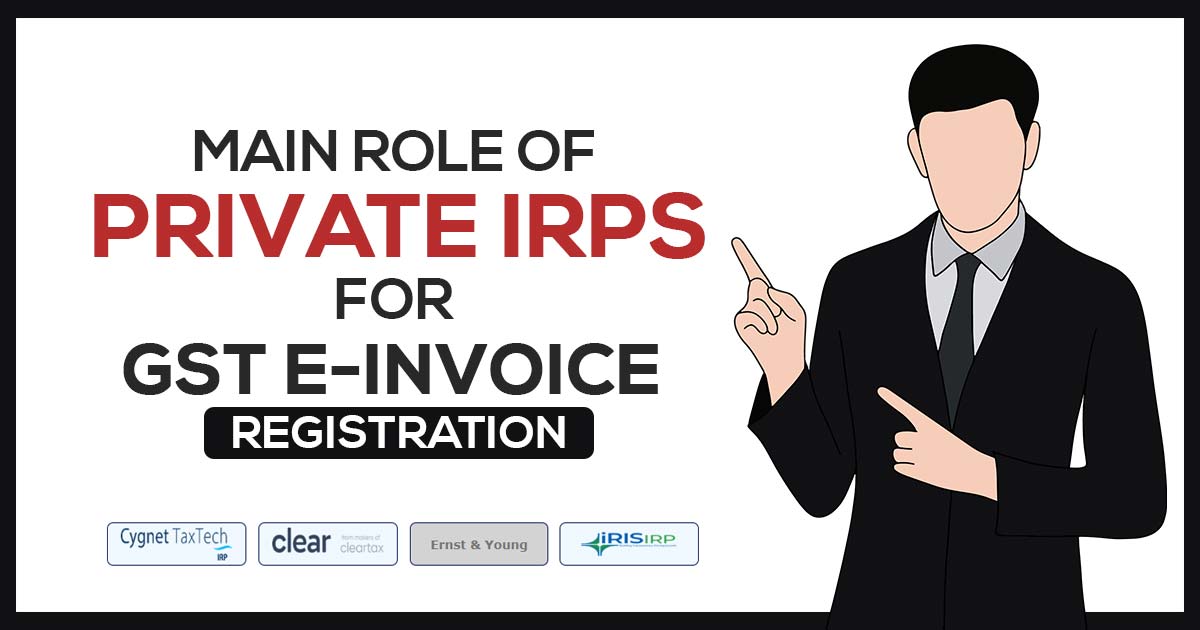
Understanding the Invoice Registration Portal (IRP)
IRP is the official portal introduced by the Indian Government for businesses to generate e-invoices under GST. To get a unique IRN (Invoice Reference Number), taxpayers can register their B2B invoices and export them. In the absence of an IRN number, an invoice is considered invalid.
The Goods and Services Tax Network (“GSTN”) launched the e-invoice registration services through multiple private Invoice Registration Portals (“IRPs”) by advisory dated March 4, 2023, in compliance with the GST Council’s suggestion. Here, the IRPs’ specifics are discussed.
Taxpayers are now able to register their GST e-invoices utilizing several IRPs. The prior single e-invoice registration portal’s capacity and redundancy are greatly increased as a result.
Latest Update
- The GSTN issued a new advisory announcing the successful integration of E-Waybill services with four new IRP portals. Read more
- A comprehensive guide and instructions to integrate any of the 6 IRPs for E-Invoice reporting. View more, Read PDF
IRN and QR Code for B2B Invoices via IRP
The e-Invoice System enables GST-registered individuals to submit all B2B invoices by providing them with a unique Invoice Reference Number (IRN), a digitally signed e-invoice, and a QR code via the Invoice Registration Portal (IRP).
As a further step towards further digitizing the business process flow, GSTN launched GST e-invoice registration services through a number of private IRPs on the recommendation of the GST (Goods and Service Tax) Council. All national GST taxpayers can access these e-invoice registration services thanks to the appointment of four commercial companies by the GSTN.
It would be simpler for taxpayers to comply with the law if an electronic invoice that has been digitally signed and exchanged seamlessly between buyers and sellers through connectivity with the GST system.
IRPs Simplify the Process of Auto-filling Details into Returns
Furthermore, it will simplify the process of auto-drafting and auto-filling invoice information into GST returns, enhancing accuracy, the correctness of supply reporting, and the capacity of supply recipients to submit Input Tax Credit claims.
E-invoicing is the best solution businesses use to generate bills of purchases and provide genuine receipts to their buyers. Including e-invoicing in business has proved to be a positive step as it has streamlined the process of invoicing and prevented tax evasion at some point. The government implemented e-invoice practice in a phased manner.
Businesses generating an aggregate revenue of Rs. 5 crore or more are required to provide e-invoices under Goods and Services Tax (GST), starting from August 1.
Important: GST E-invoicing Mandatory for Taxpayer T.O. Exceeding 5Cr
GST-registered businesses in India, at present, stand at 1.4 crore. Among these around 5 lakh businesses have included generating e-invoice practice in their billing procedure.
The government only had one e-invoicing portal, so it was a big barrier in the way to get all the businesses under e-invoicing. To include more companies and reduce the limit down the line, the government needed to extend the capacity of e-invoice generation. And to do so, it was required to establish more Invoice Registration Portals (IRPs) to implement it straightforwardly.
What Is the Role of IRPs?
To help companies in generating IRN easily, the government has decided to choose four private IRPs across the nation in 2023. By reducing the e-invoicing turnover limit, private IRPs are brought into the system to streamline the procedure. Moreover, it will reduce the burden on the government portal. The four private IRPs that will take over the task are- IRIS IRP by IRIS Business Services, Cygnet IRP, Clear IRP, and E&Y.
The launching of private IRPs for generating e-invoices under the GST system in India was initially aimed at developing infrastructure and support for widening the requirement of e-invoices. The inclusion of private companies will take the process of invoicing one step ahead. The move will bring efficiency in monitoring the revenue.
After implementing private IRPs in the invoicing procedure, there will be fewer chances of technical glitches and the problem of the single point of failure of having one system will also be addressed effectively. Moreover, the government portal was unable to keep the invoice data for a longer time which was a pain in the neck for businesses to refer to it at a later date. These multiple IRPs will solve such problems as if one IRP system is down, then still business can function smoothly with another IRP.
The government allowed private tech companies to install IRPs, so the issues can be solved efficiently. These private invoice registration portals will have a range of services for businesses including invoice generation, cancellation, validation, and reporting.
Private IRPs are equipped with more exciting and useful features for businesses such as real-time invoice validation, providing invoice insights and analytics, and better visibility and control over the invoicing process all these will make compliance apparent and easier.
In conclusion, the initiative of bringing private IRPs into the billing process will help businesses in so many ways. It will reduce costs, enhance compliance and focus on their core activities, and fuel the economic growth of the nation.